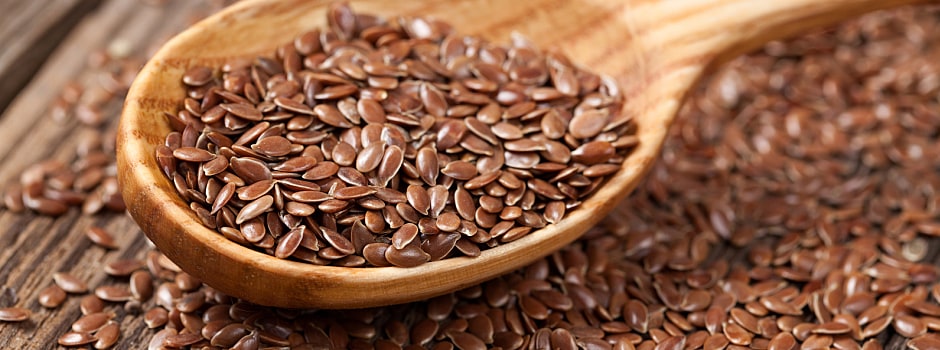You may have passed bags of the little brown seeds known as flaxseed in your local grocery store. You've probably even heard that flaxseed is good for you. After all, flax has been popular among health-conscious individuals for a long time. But what exactly are some flaxseed benefits, and how can you incorporate the seeds into your diet? Here are some tips to guide you.
Flaxseed Benefits
For a little brown seed, flax has a pretty impressive nutritional profile that can help keep you healthy. Here are some of the components that make it a powerhouse ingredient.
Protein
According to Cara Harbstreet, a registered dietitian, flaxseed is a great source of plant-based protein, especially if you're vegetarian or vegan. One ounce contains almost six grams of protein. Consuming it is also a good way to switch up where you get your protein.
Fiber
Everyone could use a little more fiber in their life. It's recommended that men get 35 grams of a fiber a day and women get 25 grams. One to two tablespoons of flaxseed offers three to four additional grams of fiber. It provides an easy and quick way to get a little extra boost of fiber and help you meet your daily recommended allowance, says Harbstreet.
Omega-3 Fatty Acids
"These fatty acids are anti-inflammatory. In the standard American diet, we see an overabundance of omega-6 fatty acids, which are more pro-inflammatory," says Harbstreet. "If we can incorporate more omega-3 fatty acids, we see lower rates of inflammation and it helps with disease prevention." She also notes that this is especially important for athletes because exercise naturally promotes low-grade inflammation. Plus, omega-3s can improve your hair, nails, and skin.
Antioxidants
Flaxseed benefits also include a wide range of antioxidants and phytochemicals, which protect your body and cells from damage. "Just like you want to consume a variety of types of protein, you want to do the same with plant-based food so you can get the benefits of the full spectrum," says Harbstreet.
How to Use Flaxseed
You can add the mild-flavored seed to almost any meal. Sprinkle a tablespoon into your morning smoothie or oatmeal, or mix a few tablespoons into your pasta sauce, chili, or stew. Harbstreet also recommends baking with ground flaxseed to balance the ratio of macronutrients in baked goods.
Flaxseed is available in several forms: whole seeds, ground, and oil. Harbstreet recommends ground. "Because the whole seed has a protective outer coating, you can't fully digest it and access the benefits," she says. "When you grind it (or purchase ground flaxseed), you're making it easy for your body to access its nutrition." Be sure to store ground flaxseed in the refrigerator so it doesn't lose its taste. Flaxseed oil is a more concentrated source of omega-3 fatty acids, but you miss out on the fiber content. It's also a delicate oil with a low smoking point. It's best as a finishing ingredient, drizzled over roasted vegetables or used in place of olive oil in salad dressings.
Flaxseed doesn't have to be intimidating or scary. Now that you know the flaxseed benefits, you might be tempted to pick some up during your next grocery run. Try adding some to your next meal, and be prepared to reap the rewards!
Related Articles

4 Pantry Staples for a Healthy Lifestyle
Here are four healthy pantry staples that are readily available, easy to store, and can make many meals more filling and satisfying.

Cooking with Pumpkin Seeds: Tips and Benefits
Cooking with pumpkin seeds is easy and can result in healthy, filling, and satisfying dishes. Here's how to make the most of this staple.

Adding Flax Seed vs. Chia to Your Recipes
Loaded with healthy fats, fiber and essential minerals, flax and chia seeds are must-haves in a healthy diet



